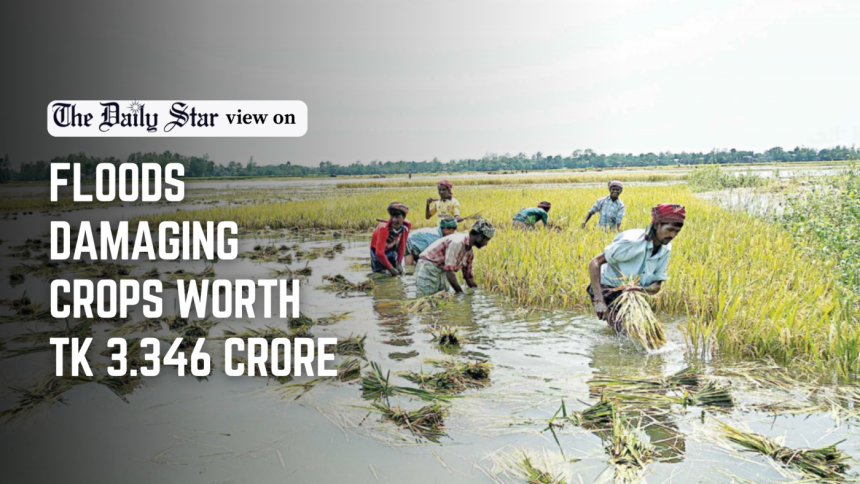Tags
Massive crop losses may hurt our food security

After the recent floods, which claimed at least 71 lives, it is evident that a long, painful rebuilding process awaits affected communities even if they are not out of the woods yet, with the Met office warning about potential short-term flooding again later this month. Saddled simultaneously with the challenges of rebuilding homes and regaining livelihoods, these people will need continued help to weather this crisis. One area of recovery that deserves particular attention is agricultural rehabilitation.
According to an estimate, the recent floods have damaged crops worth Tk 3,346 crore, with about 14.14 lakh farmers in as many as 23 districts affected. A total of 986,214 tonnes of crops—including Aush and Aman paddy, vegetables, ginger, turmeric, fruit orchards, chilies, betel leaf, watermelon, papaya, and tomatoes—have been destroyed. Among the crops, paddy production has suffered the most significant damage. The inundation of Aman paddy fields and seedbeds has resulted in 6,85,000 tonnes of Aman paddy being wiped out, while 1,06,000 tonnes of Aush paddy have suffered the same consequence. That means, Tk 2,519 crore worth of paddy alone has been destroyed. Overall, crops were grown on over 14.3 lakh hectares, about 14.58 percent of which has been damaged.
This is a huge loss for the farmers, and a blow to our food security, with its impacts already being felt in the markets. Fields that swayed with the promise of a bountiful harvest even a few weeks ago now lies barren, their crops rotting in the mud. Beyond crops, the devastation of seedbeds and fish enclosures has further deepened the crisis. In the fisheries sector, the losses in 12 most-affected districts have exceeded Tk 1,590.36 crore. Add to that the damage caused to livestock, poultry, animal feed, aquaculture infrastructure, etc. In the face of such overwhelming loss, the need for swift action to rehabilitate farmers, especially paddy farmers, cannot be overstated.
One of the immediate priorities is to make agricultural inputs—including seeds and fertilisers—readily available for replanting crops. So the authorities must reach out to all farmers in need of help. Reportedly, the government is placing the highest priority on setting up Aman seedbeds to ensure replanting in ravaged fields. Many have still complained of a crisis of seeds and lack of official help. This has to be addressed. One silver lining in this regard, as with the rescue and relief efforts throughout this flood, has been the support of volunteers, particularly students and teachers from various agricultural universities, who are collecting and preparing seeds to help farmers.
Their collaboration and coordination will be a big part of the agricultural rehabilitation process, and they must keep up these efforts. They should also ensure that fish and vegetable farmers and entrepreneurs are not left out. We must bear in mind that many of the farmers have also lost their homes and savings, and without proper financial assistance, they will be unable to purchase the necessary inputs or invest in the recovery of their land. Low-interest loans, grants, and subsidies can be made available to help them get back on their feet.
https://www.thedailystar.net/opinion/editorial/news/massive-crop-losses-may-hurt-our-food-security-3694051Published Date: September 4, 2024






